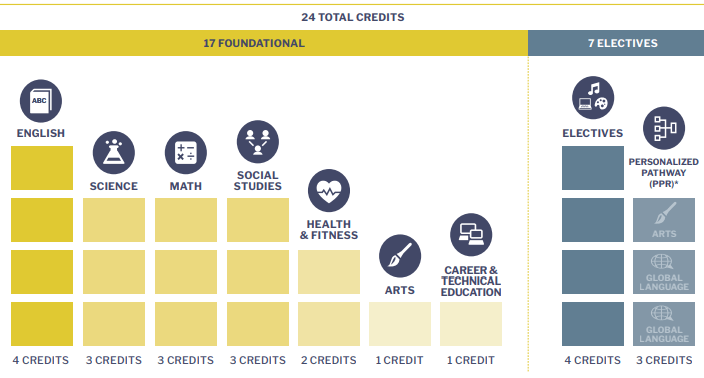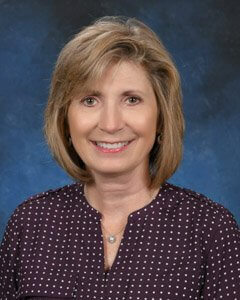Counseling Center Home
Alyssa Leigh-Smith
K-8 Counselor
Email Ms. Leigh-Smith
(360) 885-6737
Book a time to check-in via Zoom or phone
Click the appropriate link below to view the information for you or your student!
In order to graduate, students must do the following:
- Earn 24 credits
- Complete a High School and Beyond Plan
- Successfully complete a graduation pathway
- Meet Washington State History Requirement
Credit Requirements:

High School and Beyond Plan
Each student will complete a High School and Beyond Plan as part of the Washington State high school graduation requirements. Portfolios will be created during 8th grade and updated annually with final completion during the senior year.
The High School and Beyond Plan includes interest surveys, career research, course selection for high school and post-secondary planning.
Students who attend River Homelink/River Online will consult with the School Counselor for High School and Beyond requirements.
Graduation Pathways
- Meet or exceed the graduation scores on the Smarter Balanced Assessments (SBA)
- Dual credit courses (for example, Running Start or College in the High School) in English Language Arts and/or Math
- Earn a 3 or higher on certain Advanced Placement exams or a 4 or higher on certain International Baccalaureate exams, or pass the course with a C+ or higher
- Meet or exceed the graduation scores on the Math and English portions of the SAT or ACT
- Transition course (e.g. Bridge to College course, which is a senior course for students who earned a Level 2 on the SBA)
- Meet any combination of at least one English and one Math option of those options listed in # 1-5
- Meet standards on the ASVAB (Armed Services Vocational Aptitude Battery
- Complete a sequence of Career and Technical Education courses
Students can access many learning opportunities while they are enrolled at River Homelink (and other Battle Ground schools).
- CASEE Program – half day program at the Center for Agriculture, Science, and Environmental Education, GRADES 9-12
- Running Start – full or part time program at Clark College, GRADES 11-12
- Cascadia Tech Academy – half day program in Vancouver, GRADES 11-12
College Planning
College planning checklists help students prepare for college. Use the Senior Checklist and Junior Checklist to help you stay on track.
SAT/ACT Testing Information
The SAT is an entrance exam used by most colleges and universities to make admissions decisions. The purpose of the SAT is to measure a high school student’s readiness for college, and provide colleges with one common data point that can be used to compare all applicants. We recommend students take the SAT during their junior year of high school. For more information and to register for the SAT, please visit the SAT website.
The most obvious reason to take the ACT is to get into college. The higher your score, the higher the likelihood that a selective college will let you in. Every college and university in the USA accepts ACT scores, and most don’t even let you apply without submitting a standardized test score like the ACT or SAT. We recommend students take the ACT during their junior year of high school. For more information and to register for the ACT, please visit their website.
Almost all students take the PSAT during their junior year, but many students take the PSAT when they are sophomores to get the feel of the test. However, it is only the scores from the PSAT taken in your junior year that are considered for the National Merit Scholarship competition. All Battle Ground Public School district’s high schools offer the PSAT in October. Contact your high school counselor for more information.
The College Bound Scholarship
The College Bound Scholarship is a commitment of state financial aid to eligible students and is a 4-year scholarship. This PDF booklet has more information.
Financial Aid
As you prepare for college or career school, explore how financial aid works, learn about the types of aid, and find out if you’re eligible. You can also estimate what aid you may be eligible for when you check out FAFSA4caster.
*** FAFSA opens October 1 ***
Visit StudentAid.gov to apply for financial aid.
For detailed information on types of financial aid, visit Finaid.org.
title="Scholarships" tab_id="1596154498473-008ab6de-a5d0"]
Scholarship opportunities
There are many scholarship opportunities available to students. The counselors at RHL have compiled a list of some available scholarships, which include local and national scholarship programs. If you have any questions, please feel free to contact your school counselor.
River HomeLink’s Scholarship List – click to open.
Additional Scholarships List and information
River HomeLink and Battle Ground Public Schools are committed to providing a safe and healthy environment for students, families, and staff. Our strategic goal in this focus area is to support and promote the physical, emotional, and social well-being of students and staff. Visit the district website’s Social Emotional Learning page for more information about how we’re working to advance wellness and resilience in education.
Community Resources
Battle Ground Public Schools’ Family and Community Resource Center (FCRC) helps meet the needs of families faced with housing instability and similar economic challenges. The center’s staff fields requests for a variety of resources to help those in need. Those requests typically include items such as school supplies, backpacks, winter clothes and personal items that enable students to stay focused on their studies.
Battle Ground School District’s School Closure Information – https://www.battlegroundps.org/school-closure-information/
Apply for Unemployment Benefits – https://esd.wa.gov/unemployment
Childcare for Essential Workers – https://www.esd112.org/ece-center-updates/
Housing/Emergency Shelter – https://www.councilforthehomeless.org/need-help/emergency-shelter/
Clark Public Utilities Financial Assistance – https://www.clarkpublicutilities.com/residential-customers/financial-assistance/
Community Resource Locator – https://www.211info.org/
Food resources
Clark County Food Bank Food Pantry Sites (21 different sites in Clark County) – https://www.clarkcountyfoodbank.org/get-food-covid19
Apply for SNAP & TANF (Basic Food & Cash) – https://www.washingtonconnection.org/home/
Battle Ground Adventist Community Services – http://meadowglade.com/battleground-adventist-communityservices/
11117 NE 189th St.
360-687-3459
North County Community Food Bank – www.nccfoodbank.org
17 NE 3rd Ave. Battle Ground
360-687-5007
FISH of Orchards – www.fishoforchards.org
6012 NE 110th Ave.
360-256-2440
Woodland Community Service Center – http://woodlandaction.org/
360-225-9998
Internet Resources
Comcast Internet Essentials Program – https://internetessentials.com/
Xfinity has opened its public hotspots to non-Xfinity customers. Just connect to the “xfinitywifi” SSID and accept the terms and conditions. For additional information about this offer, go to www.xfinity.com/wifi.
TDS Telecommunications LLC is offering free broadband Internet access to low-income individuals and/or families with K-12 children and college students for 60 days (in response to the COVID-19 pandemic). This offer is for new customers in communities where TDS provides service. To verify eligibility for this offer, residents will be asked to provide documentation from qualifying programs. For more information, please call 1-888-287-8156. New customers must mention the 60-day free offer when calling. To check to see if TDS Internet is available in your area, you can enter your address here to see what services are available.
Comcast is taking immediate steps to help connect low-income families to the Internet at home as the country continues to manage the COVID-19 emergency. New Internet Essentials customers can receive two free months of Internet service, which is available to all qualified low-income households for $9.95/month plus tax. Apply by April 30, 2020. Additionally, for all new and existing Internet Essentials customers, the speed of the program’s Internet service has increased to 25 Mbps downstream and 3 Mbps upstream. That increase will go into effect automatically for no additional fee and it will become the new base speed for the program going forward. More info about Comcast’s Internet Essentials service offer is available here.
This is a time of high uncertainty and a lot of changes for everyone. It’s natural and to be expected that many of us are experiencing much more stress than usual.
The RHL counseling department is here to support you and your family through this challenging time.
Below is a list of resources to help you cope with the uncertainty, manage anxiety, and get the support you need. We will be updating it with additional resources as we get them, so keep checking in. If there’s something that would be helpful for you that you can’t find below, please reach out to your school counselor and let us know.
Top Tips for Coping Right Now
1) Set a reasonable limit on how much media you’re taking in. It’s fine to stay informed about how to keep yourself and your family safe and healthy, but limit the number of times you check the news, financial reports, or social media to only once or twice a day for important updates. Be sure to also limit how much time you spend talking about the latest news with family and friends. It is important to talk about how you’re feeling and how the situation is impacting you and your family – take as much time as needed to talk about that with friends and loved ones. Just don’t overwhelm yourself with endless discussions about news and updates. Once you have the information you need to stay safe, any additional information only increases anxiety.
2) Stay engaged in the here and now. The future is uncertain and a lot of our basic routines and structures are changing quickly, and that feels very uncomfortable and stressful for most people. One of the best ways to cope with uncertainty and change is to shift your focus to the things you can control and can do, right here and now. “Just do the next right thing” is a great mantra for when you’re feeling unsure. What can you do right now or today to stay safe and healthy? (Wash hands, limit trips outside the house, exercise, etc). What can you do right now/today so that things are a little better tomorrow? (Spend 10 minutes to create a good at-home learning space, check in with family about how they’re doing, etc). These things are still in your control, and focusing on them will help you feel more stable and calm during stressful times.
3) Notice Silver Linings. While many new burdens have been placed on families during this time and it’s important to acknowledge how difficult that is, there are also new opportunities. Have you ever wished for more time at home, or more time with your family? Many of us have, and while the current situation certainly is NOT what any of us envision when we make those kinds of wishes, we can choose to shift some of our focus to the new opportunities and whatever is good in our lives right now, no matter how small it may seem. Make a goal for how you can use this time so that your life will be just a little better when the crisis is over. Could you use this time to connect more with your family, learn a new skill or hobby, deep clean your living space, or something else? Find whatever silver linings you can and celebrate them. If you don’t already have a gratitude practice, now is actually a great time to start one! One thing we know in education is that whatever you focus on grows, so shift your attention to the silver linings wherever possible.
4) Focus on Safety, Predictability, and Control. Working to increase your feelings of safety, predictability, and personal control are key to coping and getting through a crisis like this with as much resilience as possible.
- Focusing on Safety includes your physical safety by following guidelines about hand washing and social distancing, creating emotional safety by reducing media exposure, and maintaining supportive relationships through phone conversations or other means – whatever helps you to feel as safe, secure, and supported as possible during this time, do it.
- Focusing on Predictability includes following or creating routines that increase your sense of stability and that you help you feel like you know at least some of what to expect from each day. When everything is new or unknown every day, it quickly becomes overwhelming. Set boundaries for when you will get new information about the changing situation, and structure the rest of your day around other things. Create a schedule for exercise, chores, personal time, learning time, and other things you and your family need to focus on each day in order to lead healthy, full lives. Doing so gives you small cornerstones of predictability to hold onto when so many larger things may feel uncertain.
- Focusing on Control includes recognizing and letting go of the things you can’t control and shifting your focus to the things you can control. Every person wants to feel like they have some control in their own lives, even (or perhaps especially) young children. We can’t control or change that schools are closed right now or that we’re being asked to stay at home, but we can control how we use the time away from school, how much we help others, and what we do to keep ourselves healthy and safe, among other things. When you’re feeling worried, ask yourself if it’s something you can control (do something about) or not. If it’s not in your control, acknowledge the worried feeling, take a deep breath, and choose to focus your thinking on what you can control (do) right now. For example, if you’re worried about a family member getting sick, recognize that’s not in your control, acknowledge the worry, and choose an action that is in your control – maybe give them a call to let them know you’re thinking of them, or offer to run errands for them so they don’t have to leave the house.
For more details, you can watch an extended, research-based webinar about this trauma-informed framework for coping with uncertainty here.
5) Practice the 3 R’s of Self-Care: Reflection, Regulation, and Relaxation. Take time for yourself and your family to reflect on how you and those around you are doing, and what supports you might need right now to get through this. Do activities that help regulate and calm feelings of anxiety – exercise, good sleep, spending time paying attention to nature (even in your backyard or through a window), doing activities that you love (hobbies, etc), and deep breathing are all great ways to help keep our emotions steady and positive. (More information on emotional regulation for kids, teens, and adults coming to the website soon). And finally, make sure you take time to relax – whenever our stress increases, we need to focus even more on relaxing whenever possible, or we’ll swiftly exhaust ourselves. Play, keep your sense of humor, keep in touch with your social support network, and be patient with yourself and others while things are difficult.
.












 610A SW Eaton Blvd ,
610A SW Eaton Blvd ,